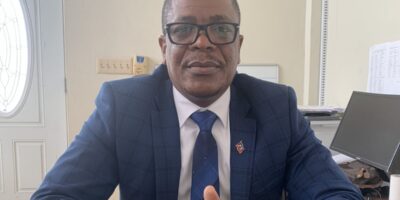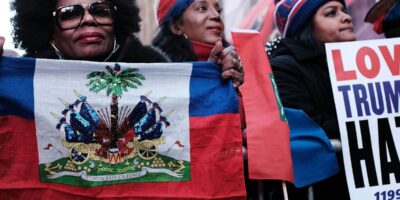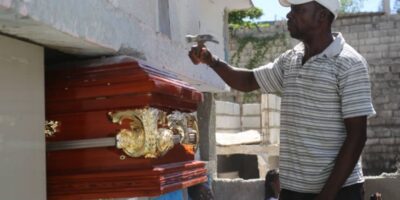On July 28, 1915, President Vilbrun Guillaume Sam was assassinated in Port-au-Prince. On the same day, US Marines invaded Haiti, beginning a military occupation that would endure until 1934. Why does this history matter in 2021? What parallels exist between 1915 and the current situation?
When the Marines landed in 1915, the US announced they were there to prevent future disorder and help Haitians have stability. However, the real reason for the invasion stemmed from US financial interests and a desire during World War I to prevent German occupation of Haiti.
Indeed, the US Navy was already anchored off the shores of Haiti, waiting for a pretext to invade. This fact was acknowledged at the time by US opponents of the Occupation, such as James Weldon Johnson and Herbert Seligmann, and since then by historians in Haiti and the United States.
Johnson argued that US financial interests in Haiti (such as loans owed to US banks and a desire to capture Haitian customs revenue) were the real driving forces for the invasion; he argued that “The overthrow of Guillaume… did not constitute the cause of American intervention in Haiti, but merely furnished the awaited opportunity.” While Haitians such as Charlemagne Péralte resisted the US Occupation zealously, they were treated as criminals and massacred by the Marines.
In theory, Haitians still ruled themselves after 1915, under Haitian President Philippe Sudré Dartiguenave. But, in practice, Dartiguenave was a figurehead, as the US military occupation determined what happened in Haiti. As Johnson wrote in 1920, Haitian government “is entirely dominated by the [US] military Occupation. President Dartiguenave, bitterly rebellious at heart as is every good Haitian, confessed to me the powerlessness of himself and his cabinet” in the face of directives from the US.
The Occupation treated Haitians brutally, forcing them to work building roads and growing sugar, for the benefit of US companies like the Haitian American Sugar Corporation (HASCO).
As US journalist Herbert Seligmann wrote in 1920, the Occupation has “served as a commentary upon the white civilization which still burns black men and women at the stake. For Haitian men, women, and children…, innocent for the most part of any offense, have been shot down by American machine gun and rifle bullets; black men and women have been put to torture to make them give information; theft, arson, and murder have been committed almost with impunity upon the persons and property of Haitians by white men wearing the uniform of the United States. Black men have been driven to retreat to the hills from actual slavery imposed upon them by white Americans.…”
The US Occupation also began transferring resources from Haitians to foreigners. In 1918 a new Constitution, drafted by Americans like future President Franklin Delano Roosevelt, was forced on Haitians in an unfree election (in which less than 5% of Haiti’s population participated, according to historian Hans Schmidt). It deleted provisions in Haiti’s 1805 constitution banning foreign ownership of land in Haiti; from then on, foreigners could buy up property in Haiti. Even today’s US State Department has recognized the gap between the Occupation’s rhetoric about helping Haitians – and its real aims: protecting U.S. assets in Haiti and preventing a German invasion.
Though US troops left Haiti in 1934, allowing Haitian President Sténio Vincent to declare a “second independence,” the threat of American invasion has remained since. It has been clear to Haitian leaders, from Vincent through to Aristide, Preval, Martelly and Moïse, that if they adopt policies contrary to the interests of the US, they risk a new military occupation.
Indeed, as Patrick Bellegarde-Smith has made clear, the US helped ensure that François Duvalier stayed in power because his anti-Communism assured US business interests that Haiti would not follow in Cuba’s footsteps. And in 1991, even as the US spoke of spreading democracy around the world, Haitian military officials on the CIA payroll effected a coup against Jean-Bertrand Aristide when his policies threatened foreign profits as well as the interests of Haitian elites. This behavior was repeated in 2004, when US Marines, once again under a pretext of creating “order”, were sent to remove Aristide from power in a second coup. Since then, as The Atlantic explained based on diplomatic cables uncovered by Wikileaks, “America has been micromanaging and manhandling the Haitian government into aligning their policies with U.S. interests.”
How does this history matter today? In the last decade, we have seen patterns continue where the US – in conjunction with the UN, OAS and other Core Group members – have continued to meddle in Haitian elections to benefit their own interests.
Ricardo Seitenfus, a former OAS special representative in Haiti during the 2011 election that brought Michel Martelly to power, himself exposed what he saw other international officials do that year; he spoke of the election as a “silent coup d’état” conducted by the international community against Haitians, under MINUSTAH occupation. Haitians have continued to fight against leaders seen as imposed from abroad – and against foreign actors (whether the BINUH or the US Embassy) who seem to think that it is their prerogative to designate Haiti’s leaders. This behavior deprives Haitians of true sovereignty, organically prompting protests – which then creates the very “disorder” that the international community uses as an excuse for further meddling.
In the wake of Jovenel Moïse’s assassination, we see such calls continuing – for instance in a Washington Post editorial of July 27, 2021, insisting that a “muscular outside intervention” is needed to “make Haitians safe.” However, just as in 1915-1934, there are friends of Haiti in the US – intellectuals, politicians and activists – who seek to expose the danger of such rhetoric. Even before 2021, US Congresspeople Barbara Lee and Andy Levin had allied themselves with the Haitian people, as they pushed the State Department and the Haitian government to answer where the PetroCaribe funds went, while expressing solidarity for “brave protesters seeking justice and fair democracy in Haiti.” And since February 2021, they and other Congresspeople (including Gregory Meeks, Ayana Pressley, Val Demings and Yvette Clark) have insisted that the US State Department support Haitian civil society instead of handpicking leaders.
Will the Biden Administration listen to these elements, as well as other US intellectuals and activists arguing for supporting the Komisyon pou yon solisyon ant Ayisyen pou kriz la and other Haitian civic groups, instead of maintaining in power leaders tapped by Mmes Helen La Lime or Michele Sison? It remains to be seen – but the fight started during the US Occupation for Haitians to maintain their independence, in Haiti by figures like Péralte and the US by the likes of Johnson and Seligmann, continues today.







Comments